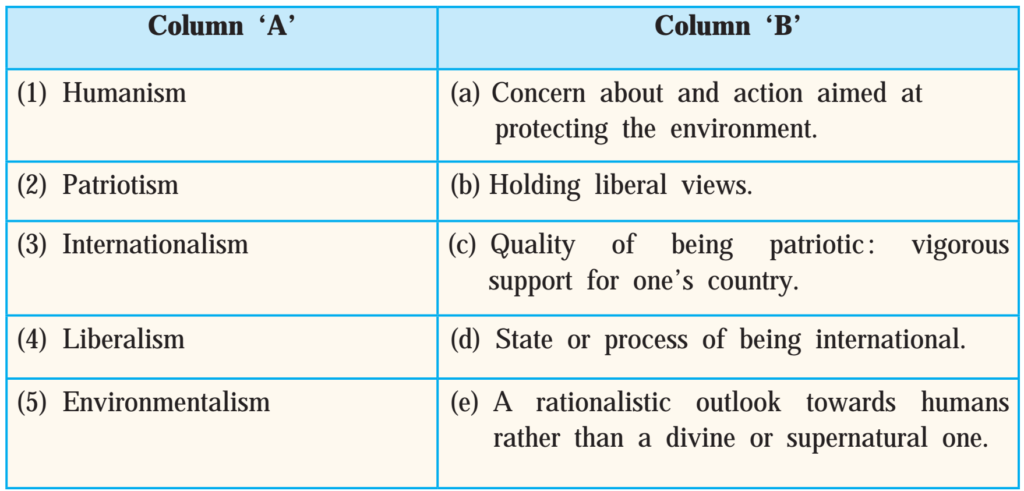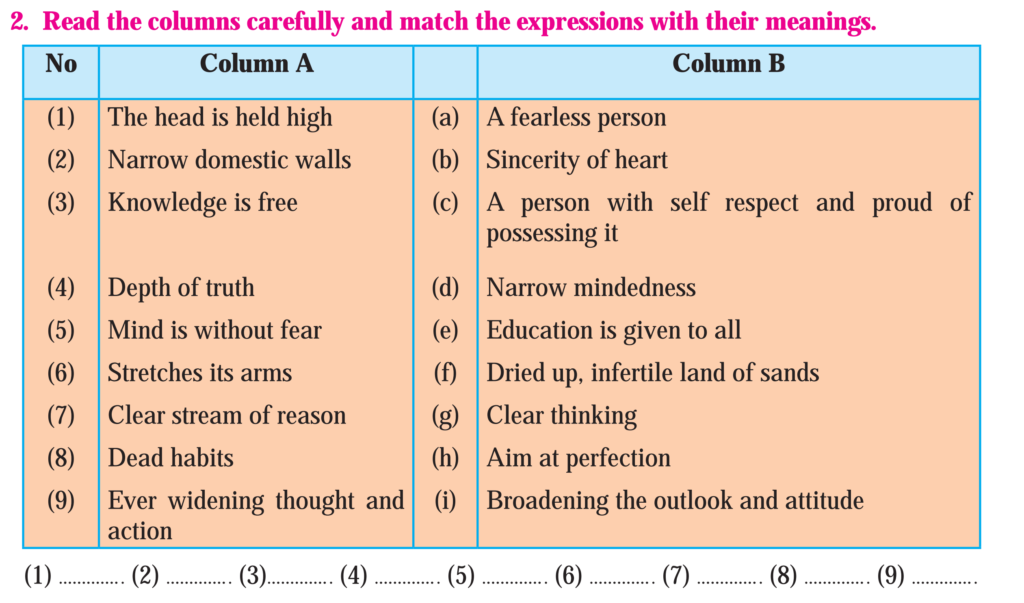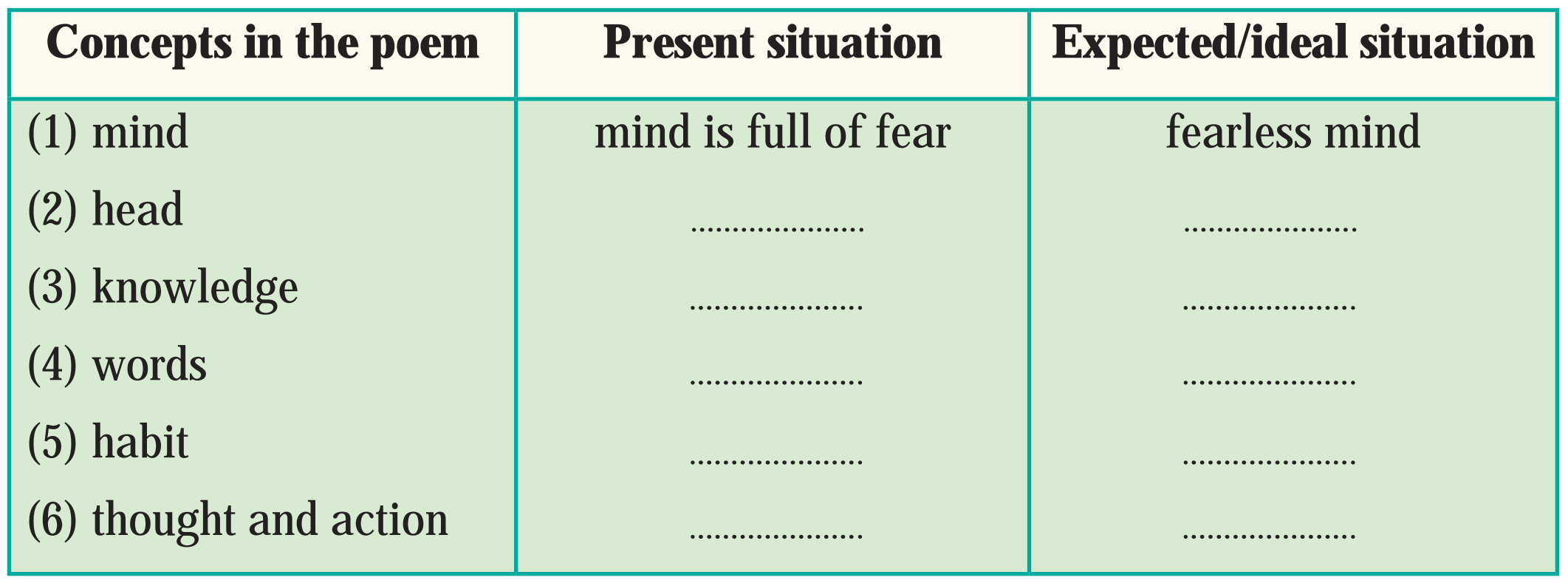… WARMING UP …
1. Pair up with your partner and match the terms with their given meanings.

Ans.
(1) Humanism – A rationalistic outlook towards humans rather than a divine or supernatural one.
(2) Patriotism – Quality of being patriotic : vigorous support for one’s country.
(3) Internationalism – State or process of being international.
(4) Liberalism – Holding liberal views.
(5) Environmentalism – Concern about and action aimed at protecting the environment.
2. Poems in English are of different types.
♦ Sonnet ♦ Epic ♦ Limerick ♦ Lyric ♦ Ballad ♦ Humorous ♦ Elegy ♦ Idyll ♦ Free verse
Taking the help of a dictionary/internet guess and write the type of poem against its description.
(i) A long story-poem, often mythical ……………
(ii) A short story poem with a message ……………
(iii) A poem of 14 lines ……………
(iv) A song-like poem ……………
(v) A poem with no uniformity of rhyme, rhythm etc. ……………
(vi) A poem set in picturesque, rustic background ……………
(vii) A sad poem, lamenting death of a loved one ……………
(viii) A 5-line short funny poem with rhyme-scheme aabba…………….
(ix) A poem written, just to create humour ……………
Ans.
(1) A long story-poem, often mythical – epic
(2) A short story poem with a message – ballad
(3) A poem of 14 lines – sonnet
(4) A song-like poem – lyric
(5) A poem with no uniformity of rhyme, rhythm, etc. – free verse
(6) A poem set in a picturesque. rustic background – idyll
(7) A sad poem, lamenting the death of a loved one – elegy
(8) A 5-line short funny poem with rhyme scheme aabba – limerick
(9) A poem written, just to create humour – humorous
… FACTUAL QUESTIONS …
What does the poet pray to the Almighty for?
Ans. The poet prays to the Almighty asking Him to awaken his country into a heaven of freedom, where the people are all truly free and total freedom of good thoughts, good words and good actions exists, while
respecting those of others.
What are ‘reason’ and ‘dead habit’ compared to?
Ans. Reason’ is compared to a clear stream, and dead habit’ is compared to the dreary desert sand.
What does the poet wish for?
Ans. The poet wishes that his country awakens into a heaven of freedom, where the people are all truly free and total freedom of good thoughts, good words and good actions exists.
… ENGLISH WORKSHOP…
1. In your notebook write down lines from the poem as a proof for the following.
(a) Tagore wishes for a nation where people are truthful.
Ans. Line : Where words come out from the depth of truth.
(b) The poet would like everyone to work hard to reach their goal and in the long run to reach perfection.
Ans. Line : Where tireless striving stretches its arms towards perfection.
(c) The poet wishes that everyone in his country holds his head high in dignity.
Ans. Line : Where the mind is without fear and the head is held high.
(d) The poet dreams of a nation where knowledge should be free to all.
Ans. Line : Where knowledge is free.
(e) The poem is a ‘prayer’.
Ans. Lines : (i) Where the mind is led forward by Thee. (ii) Into that heaven of freedom, my Father, let my country awake.

Ans.
(1) The head is held high – A person with self-respect, and proud of possessing it.
(2) Narrow domestic walls – Narrow-mindedness.
(3) Knowledge is free – Education is given to all.
(4) Depth of truth – Sincerity of heart.
(5) Mind is without fear – A fearless person.
(6) Stretches its arms – Aim at perfection.
(7) Clear stream of reason – Clear thinking.
(8) Dead habits – Dried, infertile land of sands.
(9) Ever-widening thought and action – Broadening the outlook and attitude.
3. (A) Answer the following questions in your own words.
(a) How is the world broken into fragments?
Ans. The world is broken into fragments by divisions on the basis of religion, caste, class, race and colour in societies all over the world.
(b) Explain what the ‘tireless striving’ should, be for.
Ans. ‘Tireless striving’ should be to attain one’s goals as well as to achieve perfection.
(c) ‘Where words come out from the depth of truth.’ Explain in your own words.
Ans. It means when people speak truthfully and with complete sincerity of heart.
(d) Who is ‘Thee’ in the poem? What does the poet appeal to ‘Thee’ to do?
Ans. ‘Thee’ in this poem is God. The poet wishes God to awaken his country into a heaven of freedom, where the people are all truly free and total freedom of good thoughts, good words and good actions exists.
(e) What qualities does the poet wish to inculcate in his countrymen?
Ans. The poet wants to inculcate truthfulness, fearlessness, self-confidence, industriousness, rationality and logical thinking in his countrymen.
(B) Write in your notebook your own response and justify, where needed.
(a) Is the poem a prayer for India alone?
Ans. The poem is a prayer for India alone, but it is also relevant for countries all over the world.
(b) What should the words we speak reflect?
Ans. The words we speak should reflect our sincerity and truthfulness.
(c) What should people keep on widening? How can it be done?
Ans. People should keep on widening their attitude and outlook. This can be done by getting rid of prejudices, travelling to different places and through education.
(d) From what darkness of night should our nation awaken?
Ans. Our nation should awaken from the darkness of prejudices, division of society, old traditional rituals and customs that are harmful, discrimination in imparting knowledge, insincerity, untruthfulness,
fear and lack of self-respect.
(e) What attributes of Rabindranath Tagore does the poem (prayer) reflect?
Ans. The poem reflects Rabindranath Tagore’s patriotism and love for his countrymen, his clearthinking, his broad outlook, his scientific attitude and his emphasis on hard work.
(f) What effect does the repetition of the word ‘where’ at the beginning of each line?
Ans. The repetition of the word ‘where’ at the beginning of each line denotes the increasing intensity of hope and trust the poet puts in his vision.
4. Read the poem carefully and complete the table after the discussion in pairs. One is done for you.
Ans.
5. (A) Complete the following sentences using your own interpretation.
(a) When the mind is without fear and head unbowed, we enjoy …………… freedom.
(b) When knowledge is free, every citizen enjoys the right to …………… and ……………
(c) We can prevent …………… injustice when we pull down discriminatory walls of caste, class, religion etc.
(d) Constant effort and strife leads to ……………
(e) Logical thinking and reasoning can put a stop to ……………
(f) Tagore appeals to God to make his country a ……………
Ans.
(a) When the mind is without fear and the head is unbowed, we enjoy complete freedom.
(b) When knowledge is free, every citizen enjoys the right to learn and obtain knowledge.
(c) We can prevent social injustice when we pull down discriminatory walls of caste, class, religion, etc.
(d) Constant effort and strife leads to success.
(e) Logical thinking and reasoning can put a stop to superstitions.
(f) Tagore appeals to God to make his country a heaven of freedom.
(B) Fill in the blanks.
(a) Students should keep themselves aloof from ………….
(b) When …………. everyone will be literate.
(c) It is a social duty of every student of modern world to uproot …………. from societies.
(d) Students must develop …………. outlook and attitudes.
(e) In the world of sycophancy, students must …………..
Ans.
(a) Students should keep themselves aloof from old harmful traditions.
(b) When knowledge is free everyone will be literate.
(c) It is the social duty of every student of the modern world to uproot superstitious beliefs from societies.
(d) Students must develop broad-minded outlook and attitudes.
(e) In the world of sycophancy, students must speak the truth.
6. Find out the examples of ‘Metaphor’ from the poem.
(1) ‘Clear stream of reason’. Here reason has been implicitly compared to a clear stream.
(2) ‘Dreary desert sand of dead habit’. Here old habits have been implicitly compared to dreary desert sand.
7. Almost every line of the poem begins with the word ‘Where’ and it expects an idealistic country and countrymen. Now work in a group of six students and compose your poem regarding ‘Ideal School’. Begin your lines with the word ‘Where’ . . . . .
Ans.
Where homework is home play parks
Where the thirst for knowledge defeats the greed for marks
Where being is more important than becoming
Where values are inculcated every single timing
Where teachers guide us and make us wise
Where together schoolmates play and rise
Where holidays are not such a pleasant sight
Such is our school, our only delight!
8. Read the poem. Write an Appreciation of the poem in about 12 to 15 sentences with the help of the following points. Use a paragraph format.
Points
♦ Title
♦ Poet
♦ Rhyme scheme
♦ Favourite line
♦ Theme/Central idea
♦ Figures of speech
♦ Special features – Type of the poem, language, tone, implied meaning, etc.
♦ Why I like/ dislike the poem
Ans.
Appreciation of the poem ‘Where the Mind is Without Fear…’
The poem ‘Where the mind is without fear’ has been written by Rabindranath Tagore. The poem is written in free verse without any rhyme scheme. My favourite line in this poem is ‘ I think I could turn and live with animals’. The poem is a prayer to God. Tagore addresses God as ‘my Father’ and asks Him to awaken his country into a heaven of freedom, where there is total freedom of good thoughts, good words and good actions. He wishes for a country where people would be free from fear, where knowledge would be free to all individuals and people from all castes and religions would be united. There are many figures of speech e.g. Repetition, Metaphor, Alliteration, etc. An important figure of speech is Personification- ‘Where tireless striving stretches its arms towards perfection’. Here, we can actually visualize ‘tireless striving’ stretching its arms to reach its goal. The special feature of the poem is that it expresses the difference between humans and the animals. The poet appreciates the qualities of animals like calmness, self contentment and satisfaction. They are respectable and the poet desires to live among them and learn from them and shows his dissatisfaction about human beings. I like the poem as it inculcates and teaches us the values that the animals possess and the human beings doesn’t.
9. Imagine that you have to deliver a speech on the occasion of ‘Independence Day’ or the ‘Republic Day’ in the school assembly. Prepare a speech to deliver on ‘India of my dreams’
Use the following steps :
♦ Greeting and salutation
♦ Self Introduction
♦ Introduction of the topic
♦ Elaboration of the topic with examples
♦ Conclusion
♦ Thanking audience
Ans.
The Will to Win
Respected teachers and my dear friends. A very good morning to one and all. The topic for today’s competition is “The Will to Win”. I would like to utilise this platform to share some secrets of winning with you all.
The interpretation of winning may change from person to person. The ultimate winning is happiness and satisfaction. It’s important too, that you pursue your passion and love. Don’t follow someone else’s dream, follow your dreams and goals. Sometimes life may hit you as hard as a brick does, but don’t lose hope. Always believe that those who don’t give up are the ones who become winners ultimately. You must concentrate on your activities and must not imagine the consequences. Don’t get disheartened if you fail initially, instead keep trying to remember that your mistakes gives you valuable lessons in the
end. They help you choose the right path. We have heard a lot of stories, one being ‘Slow And Steady Wins The Race’ the moral of these stories is common, that you should have the will, keep trying until you succeed.
Remember it’s the determined who win, but when you win, try to remain grounded, that’s what makes you a legend. If you never quit, you’ll never fail. This is the will to win. Winners don’t do different things, they do things differently. You have the ability to introduce changes and bring revolution in every field. Stay focused and follow your journey towards becoming a winner. Don’t forget your greatest weapon. It is your will to win.
Thank you for being such a wonderful audience.
10. Read the short story written by Rabindranath Tagore ‘The Kabuliwala’ or ‘The Home Coming.’ Visit the website and collect more information about Rabindranath Tagore’s life and work.
Ans.
The Kabuliwala
Rahmat (Chhabi Biswas),a middle-aged fruit seller from Afghanistan, comes to Calcutta to hawk his merchandise and befriends a small Bengali girl called Mini (Oindrila Tagore aka Tinku Tagore) who reminds him of his own daughter back in Afghanistan. He puts up at a boarding house along with his countrymen. One day Rehmat receives news of his daughter’s illness through a letter from his country and he decides to leave for his country. Since he is short of money he decides to sell his goods on credit for increasing his business. Later, when he goes to collect on his money, one of his customers abuses him and in the fight that ensues Rehmat warns that he will not tolerate abuse and stabs the guy when he does not stop the abuse. In the court Rehmat’s lawyer tries to obfuscate the facts but in his characteristic and simple fashion Rehmat states the truth in a matter of fact way. The judge, pleased with Rehmat’s honesty, gives him 10 years rigorous imprisonment instead of the death sentence. On the day of his release he goes to meet Mini but discovers that she has grown up into a 14-year old girl and is about to get married. Mini does not recognize Rehmat, who realizes that his own daughter must have forgotten him too. Mini’s father gives Rehmat the money for travel out of Mini’s wedding budget to which Mini agrees; she also sends a gift for Rehmat’s daughter.